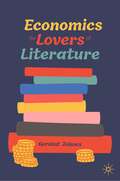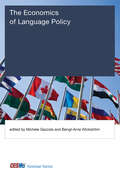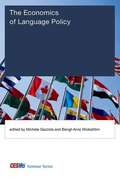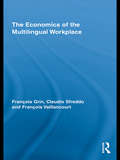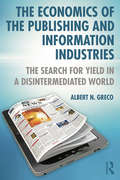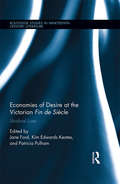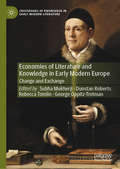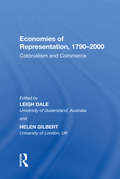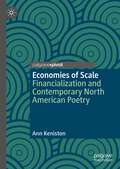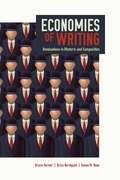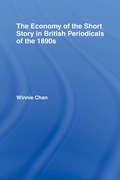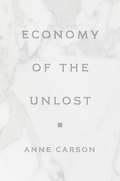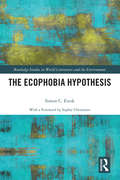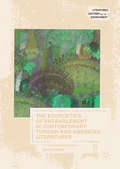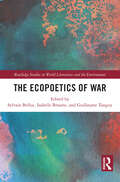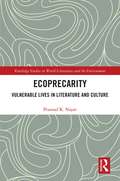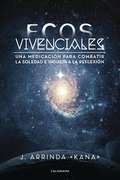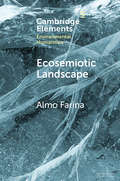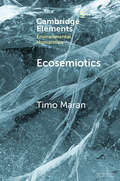- Table View
- List View
Economics and the Historian
by Thomas G. Rawski Susan B. Carter Jon S. Cohen Stephen Cullenberg Peter H. Lindert Donald N. Mccloskey Hugh Rockoff Richard SutchThese essays provide a thorough introduction to economics for historians. The authors, all eminent scholars, show how to use economic thinking, economic models, and economic methods to enrich historical research. They examine such vital issues as long-term trends, institutions, labor--including an engaging dialogue between a labor historian and a labor economist--international affairs, and money and banking. Scholars and teachers of history will welcome this volume as an introduction and guide to economics, a springboard for their own research, and a lively and provocative source of collateral reading for students at every level. The combined research experience of these authors encompasses many varieties of economics and covers a kaleidoscopic array of nations, subjects, and time periods. All are expert in presenting the insights and complexities of economics to nonspecialist audiences.
Economics for Lovers of Literature
by Geraint JohnesThis book provides an engaging introduction to economics through a literary lens. Drawing on writers such as James Joyce, George Eliot, Edith Wharton, Jane Austen, Charlotte Bronte, and Elizabeth Gaskell, each chapter is framed around a quote from a classic text of English literature that helps tease out a key economic concept and demonstrate its broader relevance. While rigorous, the book is virtually free of technical language and aims to give a concise overview of all the main topics in contemporary economics – from supply and demand, pricing, labour markets, externalities, and game theory, to environmental and behavioural economics, fiscal policy and business cycles, modern approaches to macroeconomics and economic growth.Interweaving literary examples with easy-to-follow explanations and reflective tasks, the book takes an interdisciplinary approach to economics and literature that requires no prior knowledge in either camp, but which illuminates patterns of real-world behaviour observed by novelists and economists alike. This concise and accessible book will be a valuable tool for students embarking on introductory economics courses, economics modules in business studies, and interdisciplinary courses more broadly, as well as the general reader interested in building their knowledge of economics.
Economics of Development Course-5 Block 1-4 - Karnataka University
by Karnataka State Open University Mukthagangagothri MysoreThis educational textbook is designed for third-year Bachelor of Arts (BA) students studying in the English medium under the Karnataka State Open University (KSOU), Mukthagangotri, Mysore. It provides a structured and comprehensive approach to the prescribed curriculum, aiming to enhance students’ understanding of key literary concepts, critical analysis, and language skills. The content is tailored to suit open and distance learning methods, supporting independent study while aligning with academic standards and university requirements.
The Economics of Language: International Analyses (Routledge Studies In The Modern World Economy)
by Barry R. Chiswick Paul W. MillerWritten by two internationally renowned experts in the field, this book explores the determinants of dominant language proficiency among immigrants and other linguistic minorities and the consequences of this proficiency for the labour market.Using empirical material from a range of countries, including the USA, Canada, Australia and Bolivia, the a
The Economics of Language Policy (CESifo Seminar Series)
by Michele Gazzola Bengt-Arne WickströmInsights from the application of economic theories and research methods to the management of linguistic diversity in an era of globalization.In an era of globalization, issues of language diversity have economic and political implications. Transnational labor mobility, trade, social inclusion of migrants, democracy in multilingual countries, and companies' international competitiveness all have a linguistic dimension; yet economists in general do not include language as a variable in their research. This volume demonstrates that the application of rigorous economic theories and research methods to issues of language policy yields valuable insights. The contributors offer both theoretical and empirical analyses of such topics as the impact of language diversity on economic outcomes, the distributive effects of policy regarding official languages, the individual welfare consequences of bilingualism, and the link between language and national identity. Their research is based on data from countries including Canada, India, Kazakhstan, and Indonesia and from the regions of Central America, Europe, and Sub-Saharan Africa. Theoretical models are explained intuitively for the nonspecialist. The relationships among linguistic variables, inequality, and the economy are approached from different perspectives, including economics, sociolinguistics, and political science. For this reason, the book offers a substantive contribution to interdisciplinary work on languages in society and language policy, proposing a common framework for a shared research area.ContributorsAlisher Aldashev, Katalin Buzási, Ramon Caminal, Alexander M. Danzer, Maxime Leblanc Desgagné, Peter H. Egger, Ainhoa Aparicio Fenoll, Michele Gazzola, Victor Ginsburgh, Gilles Grenier, François Grin, Zoe Kuehn, Andrea Lassmann, Stephen May, Serge Nadeau, Suzanne Romaine, Selma K. Sonntag, Stefan Sperlich, José-Ramón Uriarte, François Vaillancourt, Shlomo Weber, Bengt-Arne Wickström, Lauren Zentz
The Economics of Language Policy
by Bengt-Arne Wickström Michele GazzolaIn an era of globalization, issues of language diversity have economic and political implications. Transnational labor mobility, trade, social inclusion of migrants, democracy in multilingual countries, and companies' international competitiveness all have a linguistic dimension; yet economists in general do not include language as a variable in their research. This volume demonstrates that the application of rigorous economic theories and research methods to issues of language policy yields valuable insights. The contributors offer both theoretical and empirical analyses of such topics as the impact of language diversity on economic outcomes, the distributive effects of policy regarding official languages, the individual welfare consequences of bilingualism, and the link between language and national identity. Their research is based on data from countries including Canada, India, Kazakhstan, and Indonesia and from the regions of Central America, Europe, and Sub-Saharan Africa. Theoretical models are explained intuitively for the nonspecialist. The relationships among linguistic variables, inequality, and the economy are approached from different perspectives, including economics, sociolinguistics, and political science. For this reason, the book offers a substantive contribution to interdisciplinary work on languages in society and language policy, proposing a common framework for a shared research area.ContributorsAlisher Aldashev, Katalin Buzási, Ramon Caminal, Alexander M. Danzer, Maxime Leblanc Desgagné, Peter H. Egger, Ainhoa Aparicio Fenoll, Michele Gazzola, Victor Ginsburgh, Gilles Grenier, François Grin, Zoe Kuehn, Andrea Lassmann, Stephen May, Serge Nadeau, Suzanne Romaine, Selma K. Sonntag, Stefan Sperlich, José-Ramón Uriarte, François Vaillancourt, Shlomo Weber, Bengt-Arne Wickström, Lauren Zentz
The Economics of the Multilingual Workplace (Routledge Studies In Sociolinguistics Ser.)
by François Grin Claudio Sfreddo François VaillancourtThis book proposes a path-breaking study of the economics of multilingualism at work, proposing a systematic approach to the identification and measurement of the ways in which language skills and economic performance are related. Using the instruments of economic investigation, but also explicitly relating the analysis to the approaches to multilingualism at work developed in the language sciences, this interdisciplinary book proposes a systematic, step-by-step exploration of the issue. Starting from a general identification of the linkages between multilingualism and processes of value creation, it reviews the contributions of linguistics and economics before developing a new economic model of production in which language is taken into account. Testing of the model using data from two countries provides quantitative estimations of the influence of multilingualism on economic processes, showing that foreign language skills can make a considerable contribution to a country’s GDP. These findings have significant implications for language policy and suggest strategies helping language planners to harness market forces for increased effectiveness. A technical appendix shows how the novel technical and statistical procedures developed in this study can be generalized, and applied wherever researchers or decision makers need to identify and measure the value of multilingualism.
The Economics of the Publishing and Information Industries: The Search for Yield in a Disintermediated World
by Albert N. GrecoBooks, scholarly journals, business information, and professional information play a pivotal role in the political, social, economic, scientific, and intellectual life of nations. While publications abound on Wall Street and financial service companies, the relationship between Wall Street’s financial service companies and the publishing and information industries has not been explored until now. The Economics of the Publishing and Information Industries utilizes substantive historical, business, consumer, economic, sociological, technological, and quantitative and qualitative methodologies to understand the people, trends, strengths, opportunities, and threats the publishing industry and the financial service sector have faced in recent years. Various developments, both economic and demographic, contributed to the circumstances influencing the financial service sector’s investment in the publishing and information industries. This volume identifies and analyzes those developments, clearly laying out the forces that drove the marriage between the spheres of publishing and finance. This book offers insight and analysis that will appeal to those across a wide variety of fields and occupations, including those in financial service firms, instructors and students in business, communications, finance, or economics programs, business and financial reporters, regulators, private investors, and academic and major public research libraries.
Economies of Desire at the Victorian Fin de Siècle: Libidinal Lives (Routledge Studies in Nineteenth Century Literature)
by Patricia Pulham Jane Ford Kim Edwards KeatesThis volume marks the first sustained study to interrogate how and why issues of sexuality, desire, and economic processes intersect in the literature and culture of the Victorian fin de siècle. At the end of the nineteenth-century, the move towards new models of economic thought marked the transition from a marketplace centred around the fulfilment of ‘needs’ to one ministering to anything that might, potentially, be desired. This collection considers how the literature of the period meditates on the interaction between economy and desire, doing so with particular reference to the themes of fetishism, homoeroticism, the literary marketplace, social hierarchy, and consumer culture. Drawing on theoretical and conceptual approaches including queer theory, feminist theory, and gift theory, contributors offer original analyses of work by canonical and lesser-known writers, including Oscar Wilde, A.E. Housman, Baron Corvo, Vernon Lee, Michael Field, and Lucas Malet. The collection builds on recent critical developments in fin-de-siècle literature (including major interventions in the areas of Decadence, sexuality, and gender studies) and asks, for instance, how did late nineteenth-century writing schematise the libidinal and somatic dimensions of economic exchange? How might we define the relationship between eroticism and the formal economies of literary production/performance? And what relation exists between advertising/consumer culture and (dissident) sexuality in fin-de-siecle literary discourses? This book marks an important contribution to 19th-Century and Victorian literary studies, and enhances the field of fin-de-siècle studies more generally.
Economies of Literature and Knowledge in Early Modern Europe: Change and Exchange (Crossroads of Knowledge in Early Modern Literature #2)
by Subha Mukherji Dunstan Roberts Rebecca Tomlin George Oppitz-TrotmanPlacing ‘literature’ at the centre of Renaissance economic knowledge, this book offers a distinct intervention in the history of early modern epistemology. It is premised on the belief that early modern practices of change and exchange produced a range of epistemic shifts and crises, which, nonetheless, lacked a systematic vocabulary. These essays collectively tap into the imaginative kernel at the core of economic experience, to grasp and give expression to some of its more elusive experiential dimensions. The essays gathered here probe the early modern interface between imaginative and mercantile knowledge, between technologies of change in the field of commerce and transactions in the sphere of cultural production, and between forms of transaction and representation. In the process, they go beyond the specific interrelation of economic life and literary work to bring back into view the thresholds between economics on the one hand, and religious, legal and natural philosophical epistemologies on the other.
Economies of Representation, 1790�000: Colonialism and Commerce
by Leigh DaleAlthough postcolonialism has emerged as one of the most significant theoretical movements in literary and cultural studies, it has paid scant attention to the importance of trade and trade relations to debates about culture. Focusing on the past two centuries, this volume investigates the links among trade, colonialism, and forms of representation, posing the question, 'What is the historical or modern relationship between economic inequality and imperial patterns of representation and reading?' Rather than dealing exclusively with a particular industry or type of industry, the contributors take up the issue of how various economies have been represented in Aboriginal art; in literature by North American, Caribbean, Portuguese, South African, First Nations, Australian, British, and Aboriginal authors; and in a diverse range of writings that includes travel diaries, missionary texts, the findings of the Leprosy Investigation Commission, early medical accounts and media representations of HIV/AIDS. Examining trade in commodities as various as illicit drugs, liquor, bananas, tourism, adventure fiction, and modern Aboriginal art, as well as cultural exchanges in politics, medicine, and literature, the essays reflect the widespread origins of the contributors themselves, who are based throughout the English-speaking world. Taken as a whole, this book contests the commonplace view promoted by some modern economists-that trade in and of itself has a leveling effect, equalising cultures, places, and peoples-demonstrating instead the ways in which commerce has created and exacerbated differences in power.
Economies of Scale: Financialization and Contemporary North American Poetry (Palgrave Studies in Literature, Culture and Economics)
by Ann KenistonThis book offers the first sustained study of the ways 21st century North American poems engage with financialization. It argues that recent poems about economics not only discuss but enact concerns with containment and agency essential to the contemporary financialized economy by manipulating the seemingly old-fashioned figures of synecdoche (the representation of the whole by the part) and prosopopeia or personification. Its four body chapters offer in-depth readings of the work of eleven formally, culturally, and thematically diverse contemporary U.S. and Canadian poets who variously consider labor, consumerism, debt, and the derivative form; the Coda reads several recent poems about reparations in terms of an emerging tendency to emphasize the historical, racialized, and ethical contexts of contemporary economics. As the book explores financialization’s representation in recent poetry, it redresses arguments that poetry is irrelevant to contemporary culture.
Economies of Writing: Revaluations in Rhetoric and Composition
by Bruce Horner, Brice Nordquist, and Susan M. RyanEconomies of Writing advances scholarship on political economies of writing and writing instruction, considering them in terms of course subject, pedagogy, technology, and social practice. Taking the "economic" as a necessary point of departure and contention for the field, the collection insists that writing concerns are inevitably participants in political markets in their consideration of forms of valuation, production, and circulation of knowledge with labor and with capital. Approaching the economic as plural, contingent, and political, chapters explore complex forces shaping the production and valuation of literacies, languages, identities, and institutions and consider their implications for composition scholarship, teaching, administration, and public rhetorics. Chapters engage a range of issues, including knowledge transfer, cyberpublics, graduate writing courses, and internationalized web domains. Economies of Writing challenges dominant ideologies of writing, writing skills, writing assessment, language, writing technology, and public rhetoric by revealing the complex and shifting valuations of writing practices as they circulate within and across different economies. The volume is a significant contribution to rhetoric and composition’s understanding of and ways to address its seemingly perennial unease about its own work. Contributors: Anis Bawarshi, Deborah Brandt, Jenn Fishman, T. R. Johnson, Jay Jordan, Kacie Kiser, Steve Lamos, Donna LeCourt, Rebecca Lorimer Leonard, Samantha Looker, Katie Malcolm, Paul Kei Matsuda, Joan Mullin, Jason Peters, Christian J. Pulver, Kelly Ritter, Phyllis Mentzell Ryder, Tony Scott, Scott Wible, Yuching Jill Yang, James T. Zebroski
The Economy of the Short Story in British Periodicals of the 1890s (Literary Criticism and Cultural Theory)
by Winnie ChanThis materialist study of the short story’s development in three diverse magazines reveals how, at the dawn of modernism, commercial pressures prompted modernist formal innovation in popular magazines, whilst anti-commercial opacity paradoxically formed the basis of an effective marketing strategy that appealed to elitism. Integrating methods of cultural studies with formal analyses, this study builds upon recent work challenging Andreas Huyssen’s provocative formation, the "great divide" of modernism.
Economy of the Unlost: (Reading Simonides of Keos with Paul Celan) (Martin Classical Lectures #14)
by Anne CarsonThe ancient Greek lyric poet Simonides of Keos was the first poet in the Western tradition to take money for poetic composition. From this starting point, Anne Carson launches an exploration, poetic in its own right, of the idea of poetic economy. She offers a reading of certain of Simonides' texts and aligns these with writings of the modern Romanian poet Paul Celan, a Jew and survivor of the Holocaust, whose "economies" of language are notorious. Asking such questions as, What is lost when words are wasted? and Who profits when words are saved? Carson reveals the two poets' striking commonalities. In Carson's view Simonides and Celan share a similar mentality or disposition toward the world, language and the work of the poet. Economy of the Unlost begins by showing how each of the two poets stands in a state of alienation between two worlds. In Simonides' case, the gift economy of fifth-century b.c. Greece was giving way to one based on money and commodities, while Celan's life spanned pre- and post-Holocaust worlds, and he himself, writing in German, became estranged from his native language. Carson goes on to consider various aspects of the two poets' techniques for coming to grips with the invisible through the visible world. A focus on the genre of the epitaph grants insights into the kinds of exchange the poets envision between the living and the dead. Assessing the impact on Simonidean composition of the material fact of inscription on stone, Carson suggests that a need for brevity influenced the exactitude and clarity of Simonides' style, and proposes a comparison with Celan's interest in the "negative design" of printmaking: both poets, though in different ways, employ a kind of negative image making, cutting away all that is superfluous. This book's juxtaposition of the two poets illuminates their differences--Simonides' fundamental faith in the power of the word, Celan's ultimate despair--as well as their similarities; it provides fertile ground for the virtuosic interplay of Carson's scholarship and her poetic sensibility.
The Ecophobia Hypothesis (Routledge Studies in World Literatures and the Environment)
by Simon C. EstokThe Ecophobia Hypothesis grows out of the sense that while the theory of biophilia has productively addressed ideal human affinities with nature, the capacity of “the biophilia hypothesis” as an explanatory model of human/ environment relations is limited. The biophilia hypothesis cannot adequately account for the kinds of things that are going on in the world, things so extraordinary that we are increasingly coming to understand the current age as “the Anthropocene.” Building on the usefulness of the biophilia hypothesis, this book argues that biophilia exists on a broader spectrum that has not been adequately theorized. The Ecophobia Hypothesis claims that in order to contextualize biophilia (literally, the “love of life”) and the spectrum on which it sits, it is necessary to theorize how very un-philic human uses of the natural world are. This volume offers a rich tapestry of connected, comparative discussions about the new material turn and the urgent need to address the agency of genes, about the complexities of 21st century representations of ecophobia, and about how imagining terror interpenetrates the imagining of an increasingly oppositional natural environment. Furthermore, this book proposes that ecophobia is one root cause that explains why ecomedia—a veritably thriving industry—is having so little measurable impact in transforming our adaptive capacities. The ecophobia hypothesis offers an equation that determines the variable spectrums of the Anthropocene by measuring the ecophobic implications and inequalities of speciesism and the entanglement of environmental ethics with the writing of literary madness and pain. This work also investigates how current ecophobic perspectives systemically institutionalize the infrastructures of industrial agriculture and waste management. This is a book about revealing ecophobia and prompting transformational change.
The Ecopoetics of Entanglement in Contemporary Turkish and American Literatures
by Meliz ErginThis book foregrounds entanglement as a guiding concept in Derrida's work and considers its implications and benefits for ecocritical thought. Ergin introduces the notion of "ecological text" to emphasize textuality as a form of entanglement that proves useful in thinking about ecological interdependence and uncertainty. She brings deconstruction into a dialogue with social ecology and new materialism, outlining entanglements in three strands of thought to demonstrate the relevance of this concept in theoretical terms. Ergin then investigates natural-social entanglements through a comparative analysis of the works of the American poet Juliana Spahr and the Turkish writer Latife Tekin. The book enriches our understanding of complicity and accountability by revealing the ecological network of material and discursive forces in which we are deeply embedded. It makes a significant contribution to current debates on ecocritical theory, comparative literature, and ecopoetics.
The Ecopoetics of War (Routledge Studies in World Literatures and the Environment)
by Sylvain Belluc, Isabelle Brasme, and Guillaume TanguyThe Ecopoetics of War explores the interrelationality of human and nonhuman entities in the context of conflict, as recorded in literature and culture. This collection of essays demonstrates the specific and fertile role of literature in representations of war, as it foregrounds the manifold ways in which the borders between human and nonhuman—including flora,fauna, and technology—become porous, thus questioning traditional onto-epistemological and ethical categories.Bringing together British, American, and postcolonial studies, The Ecopoetics of War covers a variety of historical periods, geographical areas, and literary genres. Interdisciplinary in its outlook, it intertwines war studies, ecocriticism, literary theory, philosophy, and cultural studies. By analyzing the stylistic and discursive strategies devised by writers to translate the sensory experience of the battlefield, the contributors shed light on the unique capacity of literature to foreground the entanglement of human and nonhuman in the context of armed conflict, and thus unveil an “ecopoetics of war.”This collection will interest scholars of literature, specialists of war studies and ecocriticism, and any reader interested in such issues such as ecowar, ecocide, the Anthropocene, or environmental justice. It can inspire interdisciplinary teaching or research projects, especially in the current context of global environmental crisis.
Ecoprecarity: Vulnerable Lives in Literature and Culture (Routledge Studies in World Literatures and the Environment)
by Pramod K. NayarEcoprecarity: Vulnerable Lives in Literature and Culture presents an examination of ecoprecarity - the precarious lives that humans lead in the process and event of ecological disaster, and the increasing precarious state of the environment itself as a result of human interventions - in contemporary literary-cultural texts. It studies the representation of 'invasion narratives' of the human body and the earth by alien life forms, the ecodystopian vision that informs much environmental thought in popular cultures, the states of ontological integrity and genetic belonging in the age of cloning, xenotransplantation and biotechnology's 'capitalisation' of life itself, and the construction of the 'wild' in these texts. It pays attention to the ecological uncanny and the monstrous that haunts ecodystopias and forms of natureculture that emerge in the bioeconomies since the late twentieth century.
Ecos vivenciales
by J. Arrinda «Kana»Una medicación para combatir la soledad e inducir a la reflexión. <P><P>La aforística es la palabra sentida vivencialmente, no es sistematizable ni clasificable, es lo más vivencial de la experiencia humana. <P>Por ello, el aforismo se compone de fragmentos de un alma en su afección, de un alma animada en implicación y explicación: en interiorización y apertura hacia el mundo que nos rodea, sumergiéndose en las relaciones humanas en su profundidad con sus límites existenciales... <P>El lenguaje aforístico sería como una especie de fulguración de sentido donde se expresa sentimental y consentimentalmente la dimensionalidad humana en su proyección vital...
Ecosemiotic Landscape: A Novel Perspective for the Toolbox of Environmental Humanities (Elements in Environmental Humanities)
by Almo FarinaThe distinction between humans and the natural world is an artefact and more a matter of linguistic communication than a conceptual separation. This Element proposes ecosemiotics as an epistemological tool to better understand the relationship between human and natural processes. Ecosemiotics with its affinity to the humanities, is presented here as the best disciplinary approach for interpreting complex environmental conditions for a broad audience, across a multitude of temporal and spatial scales. It is proposed as an intellectual bridge between divergent sciences to incorporate within a unique framework different paradigms. The ecosemiotic paradigm helps to explain how organisms interact with their external environments using mechanisms common to all living beings that capture external information and matter for internal usage. This paradigm can be applied in all the circumstances where a living being (man, animal, plant, fungi, etc.) performs processes to stay alive.
Ecosemiotics: The Study of Signs in Changing Ecologies (Elements in Environmental Humanities)
by Timo MaranThis Element provides an accessible introduction to ecosemiotics and demonstrates its pertinence for the study of today's unstable culture-nature relations. Ecosemiotics can be defined as the study of sign processes responsible for ecological phenomena. The arguments in this Element are developed in three steps that take inspiration from both humanities and biological sciences: 1) Showing the diversity, reach and effects of sign-mediated relations in the natural environment from the level of a single individual up the functioning of the ecosystem. 2) Demonstrating numerous ways in which prelinguistic semiotic relations are part of culture and identifying detrimental environmental effects that self-contained and purely symbol-based sign systems, texts and discourses bring along. 3) Demonstrating how ecosemiotic analysis centred on models and modelling can effectively map relations between texts and the natural environment, or the lack thereof, and how this methodology can be used artistically to initiate environmentally friendly cultural forms and practices.
Ecosickness in Contemporary U.S. Fiction: Environment and Affect (Literature Now)
by Heather HouserThe 1970s brought a new understanding of the biological and intellectual impact of environmental crises on human beings. As efforts to prevent ecological and bodily injury aligned, a new literature of sickness emerged. "Ecosickness fiction" imaginatively rethinks the link between these forms of threat and the sick body to bring readers to environmental consciousness. Tracing the development of ecosickness through a compelling archive of contemporary U.S. novels and memoirs, Ecosickness in Contemporary U.S. Fiction establishes that we cannot comprehend environmental and medical dilemmas through data alone and must call on the sometimes surprising emotions that literary metaphors, tropes, and narratives deploy. In chapters on David Foster Wallace, Richard Powers, Leslie Marmon Silko, Marge Piercy, Jan Zita Grover, and David Wojnarowicz, Heather Houser shows how narrative affects such as wonder and disgust organize perception of an endangered world and orient us ethically toward it. The study builds the connective tissue between contemporary literature, ecocriticism, affect studies, and the medical humanities. It also positions ecosickness fiction relative to emergent forms of environmentalism and technoscientific innovations such as regenerative medicine and alternative ecosystems. Houser models an approach to contemporary fiction as a laboratory for affective changes that spark or squelch ethical projects.
Ecosickness in Contemporary U.S. Fiction
by Heather HouserThe 1970s brought a new understanding of the biological and intellectual impact of environmental crises on human beings, and as efforts to prevent ecological and human degradation aligned, a new literature of sickness emerged. "Ecosickness fiction" imaginatively rethinks the link between ecological and bodily endangerment and uses affect and the sick body to bring readers to environmental consciousness.Tracing the development of ecosickness through a compelling archive of modern U.S. novels and memoirs, this study demonstrates the mode's crucial role in shaping thematic content and formal and affective literary strategies. Examining works by David Foster Wallace, Richard Powers, Leslie Marmon Silko, Marge Piercy, Jan Zita Grover, and David Wojnarowicz, Heather Houser shows how these authors unite experiences of environmental and somatic damage through narrative affects that draw attention to ecological phenomena, organize perception, and convert knowledge into ethics. Traversing contemporary cultural studies, ecocriticism, affect studies, and literature and medicine, Houser juxtaposes ecosickness fiction against new forms of environmentalism and technoscientific innovations such as regenerative medicine and alternative ecosystems. Ecosickness in Contemporary U.S. Fiction recasts recent narrative as a laboratory in which affective and perceptual changes both support and challenge political projects.

